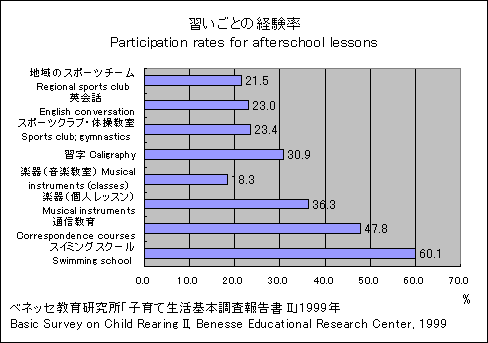Naraigoto (Lessons)
習いごと
ならいごと
Lessons taken after school and on holidays are common for subjects not taught at school or which require special skill, such as calligraphy, piano, and the abacus. The proportion of children in the lower grades of elementary school commuting to some kind of lessons is high. As students get older, they are more likely to attend juku, often called "cram schools," or yobiko (prep schools) for remedial study. This trend is especially pronounced among third-year junior and senior high school students preparing for school entrance exams.
The Citizen watch company a survey* of older elementary school students to find out how much time per week they devoted to lessons and studies outside of school. The average was 2 hours 35 minutes for lessons and 4 hours 44 minutes for juku tutoring. These are, respectively, 1 hour 17 minutes and 1 hour 51 minutes more than 20 years ago.
Related to this are the results of a survey by the Benesse corporation which found that 77 % of all children surveyed had extracurricular lessons or juku classes, and 43.4 % of this number attended more than one lesson or juku.
Children of increasingly younger age are taking lessons. The same Benesse study found that 44.6 % of children ages three and four had experienced lessons or attended juku at one time or another, and by third grade their number had grown to more than 90 %. The most popular type of after-school lesson was swimming school (around 60 %), followed by correspondence courses, lessons on a music instrument (individual lessons such as in piano and violin), calligraphy, and music classes. Others include sports club training and exercise classes, English lessons, and membership in community sports teams. Calligraphy and abacus, once the standard after-school lessons taken by young children, are now much less popular.
Community sports teams, such as little league baseball and soccer teams, are very active on Saturdays and Sundays, making use of school athletic fields and other facilities for their practices and games. The coaches for these teams are usually local volunteers or parents.

*Citizen Watch, "Children's Sense of Time," 2001
*Benesse Corporation, Monogurafu Kokosei VOL.62
|
|